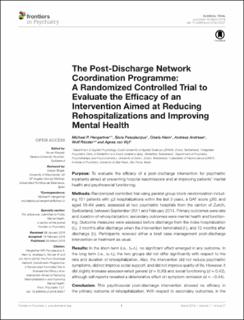Please use this identifier to cite or link to this item:
https://doi.org/10.21256/zhaw-1583| Publication type: | Article in scientific journal |
| Type of review: | Peer review (publication) |
| Title: | The post-discharge network coordination programme : a randomized controlled trial to evaluate the efficacy of an intervention aimed at reducing rehospitalizations and improving mental health |
| Authors: | Hengartner, Michael Pascal Passalacqua, Silvia Heim, Gisela Andreae, Andreas Rössler, Wulf von Wyl, Agnes |
| DOI: | 10.21256/zhaw-1583 10.3389/fpsyt.2016.00027 |
| Published in: | Frontiers in Psychiatry |
| Volume(Issue): | 7 |
| Issue: | 27 |
| Issue Date: | 2016 |
| Publisher / Ed. Institution: | Frontiers Research Foundation |
| ISSN: | 1664-0640 |
| Language: | English |
| Subject (DDC): | 362.11: Hospitals and related institutions 616.89: Mental disorders, clinical psychology and psychiatry |
| Abstract: | Purpose: To evaluate the efficacy of a post-discharge intervention for psychiatric inpatients aimed at preventing hospital readmissions and at improving patients’ mental health and psychosocial functioning. Methods: Randomized controlled trial using parallel group block randomization including 151 patients with ≤3 hospitalizations within the last 3 years, a GAF score ≤60, and aged 18-64 years, assessed at two psychiatric hospitals from the canton of Zurich, Switzerland, between September 2011 and February 2014. Primary outcomes were rate and duration of rehospitalization; secondary outcomes were mental health and functioning. Outcome measures were assessed before discharge from the index hospitalization (t0), 3 months after discharge when the intervention terminated (t1), and 12 months after discharge (t2). Participants received either a brief case management post-discharge intervention or treatment as usual. Results: In the short-term (i.e., t0-t1), no significant effect emerged in any outcome. In the long term (i.e., t0-t2), the two groups did not differ significantly with respect to the rate and duration of rehospitalization. Also, the intervention did not reduce psychiatric symptoms, did not improve social support, and did not improve quality of life. However, it did slightly increase assessor-rated general (d = 0.30) and social functioning (d = 0.42), although self-reports revealed a deteriorative effect on symptom remission (d = -0.44). Conclusion: This psychosocial post-discharge intervention showed no efficacy in the primary outcome of rehospitalization. With respect to secondary outcomes, in the long term it might lead to slightly increased social functioning but revealed no significant effect on psychopathology, social support, and quality of life. By contrast, with respect to self-reported symptom remission, it was revealed to have a negative effect. In this high-resource catchment area with comprehensive community psychiatric and social services, the intervention thus cannot be recommended for implementation in routine care. |
| URI: | https://digitalcollection.zhaw.ch/handle/11475/2257 |
| Fulltext version: | Published version |
| License (according to publishing contract): | CC BY 4.0: Attribution 4.0 International |
| Departement: | Applied Psychology |
| Organisational Unit: | Psychological Institute (PI) |
| Published as part of the ZHAW project: | Poststationäre Netzwerkkoordination (ZInEP) |
| Appears in collections: | Publikationen Angewandte Psychologie |
Files in This Item:
| File | Description | Size | Format | |
|---|---|---|---|---|
| 2016_Hengartner_The post-discharge network coordination_Frontiers in Psychiatry.pdf | 1.48 MB | Adobe PDF |  View/Open |
Show full item record
Hengartner, M. P., Passalacqua, S., Heim, G., Andreae, A., Rössler, W., & von Wyl, A. (2016). The post-discharge network coordination programme : a randomized controlled trial to evaluate the efficacy of an intervention aimed at reducing rehospitalizations and improving mental health. Frontiers in Psychiatry, 7(27). https://doi.org/10.21256/zhaw-1583
Hengartner, M.P. et al. (2016) ‘The post-discharge network coordination programme : a randomized controlled trial to evaluate the efficacy of an intervention aimed at reducing rehospitalizations and improving mental health’, Frontiers in Psychiatry, 7(27). Available at: https://doi.org/10.21256/zhaw-1583.
M. P. Hengartner, S. Passalacqua, G. Heim, A. Andreae, W. Rössler, and A. von Wyl, “The post-discharge network coordination programme : a randomized controlled trial to evaluate the efficacy of an intervention aimed at reducing rehospitalizations and improving mental health,” Frontiers in Psychiatry, vol. 7, no. 27, 2016, doi: 10.21256/zhaw-1583.
HENGARTNER, Michael Pascal, Silvia PASSALACQUA, Gisela HEIM, Andreas ANDREAE, Wulf RÖSSLER und Agnes VON WYL, 2016. The post-discharge network coordination programme : a randomized controlled trial to evaluate the efficacy of an intervention aimed at reducing rehospitalizations and improving mental health. Frontiers in Psychiatry. 2016. Bd. 7, Nr. 27. DOI 10.21256/zhaw-1583
Hengartner, Michael Pascal, Silvia Passalacqua, Gisela Heim, Andreas Andreae, Wulf Rössler, and Agnes von Wyl. 2016. “The Post-Discharge Network Coordination Programme : A Randomized Controlled Trial to Evaluate the Efficacy of an Intervention Aimed at Reducing Rehospitalizations and Improving Mental Health.” Frontiers in Psychiatry 7 (27). https://doi.org/10.21256/zhaw-1583.
Hengartner, Michael Pascal, et al. “The Post-Discharge Network Coordination Programme : A Randomized Controlled Trial to Evaluate the Efficacy of an Intervention Aimed at Reducing Rehospitalizations and Improving Mental Health.” Frontiers in Psychiatry, vol. 7, no. 27, 2016, https://doi.org/10.21256/zhaw-1583.
Items in DSpace are protected by copyright, with all rights reserved, unless otherwise indicated.